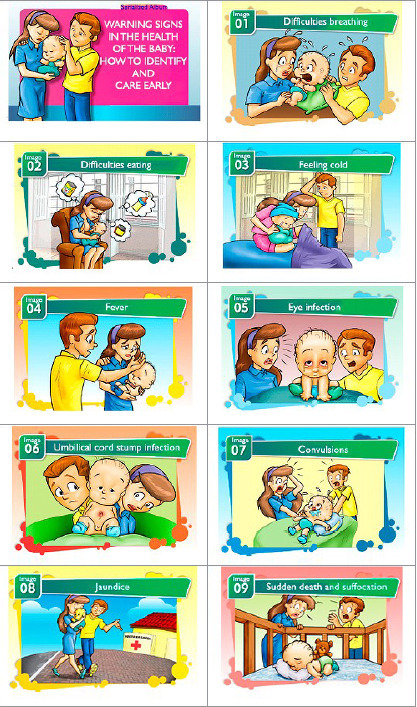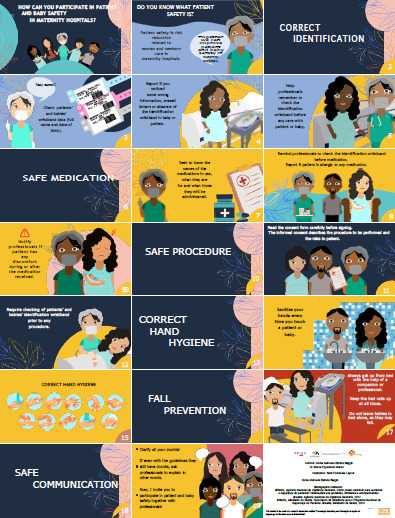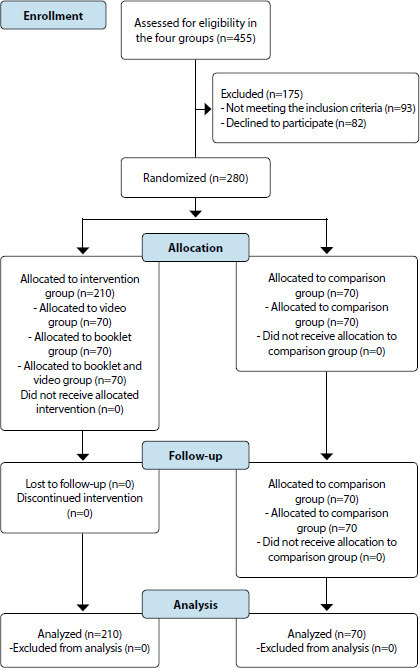-
ORIGINAL ARTICLE09-26-2022
Educational technology for infants’ families to identify warning signs: a validation study
Revista Brasileira de Enfermagem. 2022;75(5):e20210964
Abstract
ORIGINAL ARTICLEEducational technology for infants’ families to identify warning signs: a validation study
Revista Brasileira de Enfermagem. 2022;75(5):e20210964
DOI 10.1590/0034-7167-2021-0964
Views0See moreABSTRACT
Objective:
To validate, with the target audience, the usability and appearance of a serialized album about the warning signs to the health of children below 2 months.
Method:
Methodological validation study with the target population of an educational material in the form of a serialized album. 11 mothers with children under 2 months of age participated. The domains evaluated were: Objectives, Organization, Writing Style, Appearance, and Motivation. Data were analyzed using descriptive and statistics, and the data agreement index was calculated.
Results:
The global data agreement index was high (0.99). Mothers had positive responses, recognizing the excellence of the material: attractive figures that were easy to understand.
Conclusion:
The validation of the serialized album provides mothers with the abilities and knowledge they need to identify warning signs in regard to the health of their children, providing them with autonomy, corresponsibility, and helping them develop better child health practices.

-
ORIGINAL ARTICLE09-26-2022
Participatory development of educational technology in seeking patient safety in maternity hospitals
Revista Brasileira de Enfermagem. 2022;75(5):e20210701
Abstract
ORIGINAL ARTICLEParticipatory development of educational technology in seeking patient safety in maternity hospitals
Revista Brasileira de Enfermagem. 2022;75(5):e20210701
DOI 10.1590/0034-7167-2021-0701
Views1See moreABSTRACT
Objectives:
to develop a booklet as an educational technology, together with health professionals, patients and companions, aiming at their involvement in patient safety in maternity hospitals.
Methods:
a qualitative convergent care study, carried out in three stages at a maternity hospital in Belo Horizonte. The booklet construction took place between February and April 2021, with 13 professionals, 06 companions and 11 patients.
Results:
data content analysis was performed, creating three categories: Knowledge and experiences about patient and newborn safety in maternity hospitals; Challenges for involving patient and companion in safety actions; Assessment of patients, companions and professionals on the booklet construction process. The booklet construction involved the participation of health professionals, users and companions in all stages of the process.
Final considerations:
the participatory process enabled the creation of educational technology for the involvement of patients and companions in patient safety actions.

-
09-26-2022
Efeitos das tecnologias educacionais sobre a auto-eficácia materna na prevenção da diarreia infantil: um ensaio clínico
Revista Brasileira de Enfermagem. 2022;75(5):e20210339
Abstract
Efeitos das tecnologias educacionais sobre a auto-eficácia materna na prevenção da diarreia infantil: um ensaio clínico
Revista Brasileira de Enfermagem. 2022;75(5):e20210339
DOI 10.1590/0034-7167-2021-0339
Views1See moreRESUMEN
Objetivo:
evaluar el efecto de las intervenciones educativas sobre la autoeficacia materna en la prevención de la diarrea infantil en madres de niños menores de cinco años.
Métodos:
Ensayo clínico aleatorizado básico con 280 madres de niños menores de cinco años.
Resultados:
hubo un aumento estadísticamente significativo en los puntajes de autoeficacia materna después de la aplicación de las intervenciones. Hubo un aumento estadísticamente significativo en los puntajes de autoeficacia materna después de la aplicación del video (p= 0,026), folleto (p <0,001) y video y folleto (p <0,001).
Conclusión:
el uso combinado de video y folleto demostró ser más eficaz en la promoción de la autoeficacia que el uso aislado. Por lo tanto, se ha demostrado que las intervenciones utilizadas en este estudio aumentan significativamente la autoeficacia materna en la prevención de la diarrea infantil y, por lo tanto, pueden ser utilizadas por los profesionales de la salud como herramientas eficaces.
-
ORIGINAL ARTICLE09-26-2022
Effects of educational technologies on maternal self-efficacy in preventing childhood diarrhea: a clinical trial
Revista Brasileira de Enfermagem. 2022;75(5):e20210339
Abstract
ORIGINAL ARTICLEEffects of educational technologies on maternal self-efficacy in preventing childhood diarrhea: a clinical trial
Revista Brasileira de Enfermagem. 2022;75(5):e20210339
DOI 10.1590/0034-7167-2021-0339
Views0See moreABSTRACT
Objective:
To evaluate the effect of educational interventions on maternal self-efficacy in preventing childhood diarrhea in mothers of children younger than five years old.
Methods:
Basic randomized clinical trial involving 280 mothers of children under five years old.
Results:
There was a statistically significant increase in maternal self-efficacy scores after the application of the video (p= 0.026), booklet (p <0.001) and video and booklet (p <0.001).
Conclusion:
The combined use of video and booklet proved to be more effective in promoting self-efficacy than the isolated use. Thus, the interventions used in this study have been shown to significantly increase maternal self-efficacy in preventing childhood diarrhea and, therefore, can be used by health professionals as effective tools.

-
REVIEW09-26-2022
Eating self- efficacy in overweight and obese children and adolescents: integrative review of instruments
Revista Brasileira de Enfermagem. 2022;75(5):e20210301
Abstract
REVIEWEating self- efficacy in overweight and obese children and adolescents: integrative review of instruments
Revista Brasileira de Enfermagem. 2022;75(5):e20210301
DOI 10.1590/0034-7167-2021-0301
Views1See moreABSTRACT
Objective:
To describe the characteristics of instruments to assess eating self-efficacy in overweight and obesity in children and adolescents.
Methods:
Integrative literature review, conducted in May 2020, in six databases (PubMed; Web of Science; Scopus; CINAHL, ADOLEC, and PsycINFO) with the following search strategy: Self-efficacy and (Overweight OR Obesity) and (Child* OR Adolescent).
Results:
The inclusion of thirty-five articles and twenty-one instruments was applied to children 6 to 9 years old (n=2), adolescents 10 to 19 years old (n=9), and children and adolescents 7 to 18 years old (n=10). The instruments have 4 to 30 items and vary from two to five dimensions, the most frequent being “healthy eating” and “physical activity.”
Conclusion:
There are different reliable instruments designed to assess eating self-efficacy in adolescents and children, indicating the importance of this construct for preventing and controlling obesity and overweight.

-
TECHNOLOGICAL INNOVATION09-24-2022
Transitional care from the hospital to the home in heart failure: implementation of best practices
Revista Brasileira de Enfermagem. 2022;75(1):e20210123
Abstract
TECHNOLOGICAL INNOVATIONTransitional care from the hospital to the home in heart failure: implementation of best practices
Revista Brasileira de Enfermagem. 2022;75(1):e20210123
DOI 10.1590/0034-7167-2021-0123
Views0See moreABSTRACT
Objectives:
Assess the compliance of the implementation of better evidence in the transitional care of the person with heart failure from the hospital to the home.
Methods:
Evidence implementation project according to the JBI methodology in a cardiology hospital in São Paulo. Six criteria were audited before and after implementing strategies to increase compliance with best practices. 14 nurses and 22 patients participated in the audits.
Results:
In the baseline audit, compliance was null with five of the six criteria. Strategies: training of nurses; reformulation of the hospital discharge form and guidance on self-care in care contexts; and making telephone contact on the 7th, 14th and 21st days after discharge. In the follow-up audit, there was 100% compliance with five of the six criteria.
Conclusion:
The project made it possible to increase the compliance of transitional care practices in people with heart failure with the recommendations based on the best evidence.

-
ORIGINAL ARTICLE09-24-2022
Nurses’ performance in palliative care: spiritual care in the light of Theory of Human Caring
Revista Brasileira de Enfermagem. 2022;75(1):e20210029
Abstract
ORIGINAL ARTICLENurses’ performance in palliative care: spiritual care in the light of Theory of Human Caring
Revista Brasileira de Enfermagem. 2022;75(1):e20210029
DOI 10.1590/0034-7167-2021-0029
Views1See moreABSTRACT
Objectives:
to analyze nurses’ role in assisting patients in palliative care, with emphasis on the spiritual dimension, in the light of Theory of Human Caring.
Methods:
this is an exploratory, qualitative study, carried out in a hospital in João Pessoa, Paraíba, between August and December 2019, with 10 nurses. For data collection, semi-structured interviews were used. For analysis, we opted for content analysis.
Results:
the spiritual dimension of care is contemplated by several religious and spiritual practices. These are respected and encouraged by nurses, although there is difficulty in providing care for the spiritual dimension.
Final Considerations:
nurses have attitudes consistent with Jean Watson’s Theory and apply the Caritas Process elements during assistance to patients’ spiritual dimension in palliative care.
-
ORIGINAL ARTICLE09-24-2022
Patient safety in nursing technician training
Revista Brasileira de Enfermagem. 2022;75(1):e20201364
Abstract
ORIGINAL ARTICLEPatient safety in nursing technician training
Revista Brasileira de Enfermagem. 2022;75(1):e20201364
DOI 10.1590/0034-7167-2020-1364
Views0See moreABSTRACT
Objectives:
to analyze the contents on patient safety in the training of nursing technicians.
Methods:
a documentary study, conducted in three technical nursing courses at a public university in northeastern Brazil, based on the Multi-Professional Patient Safety Curriculum Guide, published by the World Health Organization.
Results:
we found that, of the 26 subjects in each course, the tracking terms were found in 22 subjects in the A/C courses, 23 in the B course. The topics of the guide with the highest number of terms were the improvement in medication safety, with 85 terms (22.6%), and Infection prevention and control, with 75 terms (20%). The contents do not express the comprehensiveness of patient safety education; some subjects had this focus, while others did not.
Conclusions:
the documents revealed gaps in the contents related to patient safety and demonstrated that they are addressed only in the course syllabus and discipline plans.
-
REVIEW09-18-2020
Allocation of resources for health care in COVID-19 pandemic times: integrative review
Revista Brasileira de Enfermagem. 2020;73:e20200244
Abstract
REVIEWAllocation of resources for health care in COVID-19 pandemic times: integrative review
Revista Brasileira de Enfermagem. 2020;73:e20200244
DOI 10.1590/0034-7167-2020-0244
Views0See moreABSTRACT
Objective:
To analyze information on resource allocation in the context of the COVID-19 pandemic, published in indexed scientific journals, from December 2019 to March 2020.
Methods:
This is an integrative literature review, which took place in March 2020. All databases were investigated and studies were found only in MEDLINE. After applying the established criteria, six articles were selected.
Results:
It was evident that the allocation of resources is carried out as the demands emerge. The fragility in presenting scientific-methodological evidence that can guide decision makers for assertive allocation of available resources is highlighted. The results showed that studies on this subject are incipient and need to be expanded.
Final considerations:
The need for health organizations and area authorities to be better prepared for the proper use of available resources, with allocation based on scientific evidence and maximization of resources is indicated.

-
ORIGINAL ARTICLE05-24-2021
Critical thinking in nursing training: evaluation in the area of competence Education in Health
Revista Brasileira de Enfermagem. 2021;74:e20200979
Abstract
ORIGINAL ARTICLECritical thinking in nursing training: evaluation in the area of competence Education in Health
Revista Brasileira de Enfermagem. 2021;74:e20200979
DOI 10.1590/0034-7167-2020-0979
Views0See moreABSTRACT
Objective:
To analyze the constitution of critical thinking in nursing training in the approach by competence and the integrated curriculum, considering the evaluation process by capturing its challenges, and proposing overcoming strategies.
Methods:
Qualitative. In the first phase of data collection, interviews were conducted with twenty-four professors, nine preceptors, and fifteen students to reconstruct the profile of competence, and in the second phase, a workshop to validate the profile identified challenges and proposals. The Collective Subject Discourse was used to analyze the interviews and the holistic competence reference in reconstructing the profile.
Results:
The critical thinking is built based on experiences in the world of work, and evaluation is the conductor of reflections towards emancipation.
Final considerations:
It signals the importance of professor training in the learning evaluation and working with the collective construction of subjects to overcome challenges that happen in the changes of training.
-
REFLECTION10-26-2020
Covid-19 pandemic and the motivations for demanding health service in indigenous villages
Revista Brasileira de Enfermagem. 2020;73:e20200312
Abstract
REFLECTIONCovid-19 pandemic and the motivations for demanding health service in indigenous villages
Revista Brasileira de Enfermagem. 2020;73:e20200312
DOI 10.1590/0034-7167-2020-0312
Views0See moreABSTRACT
Objective:
To discuss the fundamental aspects in the establishment of preventive measures to tackle covid-19 among indigenous people in view of the motivations for seeking health care in villages of the Terra Indígena Buriti, Mato Grosso do Sul, Brazil.
Methods:
Theoretical-reflective study based on assumptions of the National Health System and previous ethnographic research that enabled the identification of the motivations to seek health care in Buriti villages.
Results:
Indigenous people seek health centers for health care programs assistance, treatment of cases they cannot resolve and to chat. Such motivations were the basis for discussing the indigenization process in the confrontation of the new coronavirus pandemic in indigenous lands.
Final considerations:
The motivations for seeking health care show the physical and social vulnerability of the Terena ethnicity. The effectiveness of the social isolation measure in the villages depends on the dialogue with indigenous leaders, professional engagement and intersectoral actions.
-
ORIGINAL ARTICLE07-10-2020
Formation of protagonist adolescents to prevent bullying in school contexts
Revista Brasileira de Enfermagem. 2020;73:e20190418
Abstract
ORIGINAL ARTICLEFormation of protagonist adolescents to prevent bullying in school contexts
Revista Brasileira de Enfermagem. 2020;73:e20190418
DOI 10.1590/0034-7167-2019-0418
Views0See moreABSTRACT
Objective:
to develop a participative strategy of health education in the formative process of protagonist adolescents aimed at preventing school bullying.
Method:
qualitative interventive-participatory research, based on the Community-Based Participatory Research and in the Culture Circles of Paulo Freire. The sample was intentional, with the participation of 12 adolescents who were considered leaders. For data production at the moment of educational intervention, observation techniques were employed with note-taking in a field diary, plus photographic and video records.
Results:
the pedagogical intervention model raised the opportunity for the adolescents’ active participation, aiming at the development of skills that create pro-social behaviors, empathetic and assertive relations, which are able to face bullying and transform the school environment.
Final considerations:
the use of participative methodologies, in the youth protagonism perspective, has the potential to support educational practices of school nurses in collaboration and leadership of antibullying programs.

-
03-26-2021
Professional competency for elder care: perception among professors, nursing students, and nurses
Revista Brasileira de Enfermagem. 2021;74:e20200446
Abstract
Professional competency for elder care: perception among professors, nursing students, and nurses
Revista Brasileira de Enfermagem. 2021;74:e20200446
DOI 10.1590/0034-7167-2020-0446
Views0See moreABSTRACT
Objective:
to know the perception of nurses, undergraduate students, and professors about the competencies for professional nurses in elder care.
Methods:
this is a qualitative analytical study developed with six professors, four nurses, and 12 nursing students. Data were collected through semi-structured interviews and analyzed using Fiorin’s Discourse technique, with support from the MAXQDA software.
Results:
the competencies identified included knowledge of theories and general concepts of gerontology, communication, listening, leadership, teamwork, proactivity, respect, and empathy.
Final considerations:
knowing the competencies contributes to understanding the aging process and qualifying nurses for elder care.
-
ORIGINAL ARTICLE08-30-2021
Family functionality and burden of family caregivers of users with mental disorders
Revista Brasileira de Enfermagem. 2021;74(5):e20201061
Abstract
ORIGINAL ARTICLEFamily functionality and burden of family caregivers of users with mental disorders
Revista Brasileira de Enfermagem. 2021;74(5):e20201061
DOI 10.1590/0034-7167-2020-1061
Views0See moreABSTRACT
Objective:
to verify the difference of mean or median in the scores of family functionality and burden of family caregivers of people with mental disorders.
Methods:
cross-sectional study carried out in a Psychosocial Care Center with 61 family caregivers. Instruments were used for sociodemographic characterization, care process, Family Apgar Index and Family Burden Interview Schedule. Mean/median difference tests were adopted.
Results:
women with mental disorders and the presence of children in the home decreased the median of the family Apgar score. Difficulty in the relationship between caregiver/user, nervousness/tension, physical aggression and agitation of patients increased the global average of subjective burden.
Conclusions:
nursing interventions to reduce burden and promote family functionality should prioritize caregivers of women with mental disorders, assist them in managing troublesome behaviors and raising awareness of family nucleus to co-responsibility for caring for sick people, especially in families with children who demand daily care.
-
REVIEW07-06-2020
Middle-Range Theory for the Nursing Diagnosis of Low Self-Efficacy in Health
Revista Brasileira de Enfermagem. 2020;73(5):e20190370
Abstract
REVIEWMiddle-Range Theory for the Nursing Diagnosis of Low Self-Efficacy in Health
Revista Brasileira de Enfermagem. 2020;73(5):e20190370
DOI 10.1590/0034-7167-2019-0370
Views0See moreABSTRACT
Objectives:
theoretical validation of the concept of low self-efficacy in health as a nursing diagnosis construct.
Methods:
construction of a middle-range theory for validating diagnoses, comprised of five stages: definition of the approach for building the theory; definition of the main concepts; creation of a pictorial diagram; formulation of proposals; establishment of causal relationships and evidence for clinical practice. The main concepts were identified through a literature review and the studies were taken from the LILACS, SCOPUS, CINAHL and PubMed/MEDLINE databases. The final sample was comprised of 92 articles.
Results:
eighteen etiological factors and 16 clinical indicators were identified; characterized as antecedents and manifestations for inferring a diagnosis of low self-efficacy in health.
Conclusions:
the related concepts of the new nursing diagnosis of low self-efficacy in health, to be applied in clinical nursing practice, were identified and defined.

-
REFLECTION06-04-2021
Care in pediatric nursing from the perspective of emotions: from Nightingale to the present
Revista Brasileira de Enfermagem. 2021;74(4):e20200377
Abstract
REFLECTIONCare in pediatric nursing from the perspective of emotions: from Nightingale to the present
Revista Brasileira de Enfermagem. 2021;74(4):e20200377
DOI 10.1590/0034-7167-2020-0377
Views0See moreABSTRACT
Objective:
Reflect on the evolution of pediatric nursing care from the perspective of emotions, from the conceptions of Florence Nightingale to the present.
Method:
Reflective study based on theoretical and experiential aspects of emotional care in pediatric nursing.
Results:
From Nightingale, there were many definitions regarding the nursing care in an integrative and humanist logic; and with certain bond to emotional dimension. That time, nursing care was based on the religious conceptions of charity and love of our neighbor and, despite the conceptualization that shapes nursing science today, such conceptions have not ceased to be its attribute, mainly in the care of pediatric nurses.
Final considerations:
In pediatric nursing, nurture care with affection and facilitate emotions management in each interaction nurse-child-family is crucial for caring. This emotional care should evolve into a competence that recognizes the expertise and merit of professional action.
Search
Search in:
Nuvem de Tags
Adolescente (85) Atenção Primária à Saúde (239) COVID-19 (91) Criança (91) Cuidados de Enfermagem (269) Educação em Enfermagem (151) Educação em Saúde (139) Enfermagem (930) Enfermagem Pediátrica (86) Estudantes de Enfermagem (77) Estudos de Validação (131) Família (87) Idoso (208) Promoção da Saúde (99) Qualidade de Vida (104) Saúde do Trabalhador (86) Saúde Mental (145) Saúde Pública (82) Segurança do Paciente (150) Tecnologia Educacional (100)



